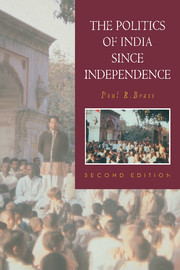Book contents
- Frontmatter
- Dedication
- CONTENTS
- List of figures and tables
- Preface
- List of abbreviations
- 1 Introduction: continuities and discontinuities between pre- and post-Independence India
- PART I POLITICAL CHANGE
- Introduction
- 2 Political change, political structure, and the functioning of government
- 3 Parties and politics
- 4 State and local politics
- PART II PLURALISM AND NATIONAL INTEGRATION
- PART III POLITICAL ECONOMY
- Bibliography
- Index
2 - Political change, political structure, and the functioning of government
Published online by Cambridge University Press: 05 February 2015
- Frontmatter
- Dedication
- CONTENTS
- List of figures and tables
- Preface
- List of abbreviations
- 1 Introduction: continuities and discontinuities between pre- and post-Independence India
- PART I POLITICAL CHANGE
- Introduction
- 2 Political change, political structure, and the functioning of government
- 3 Parties and politics
- 4 State and local politics
- PART II PLURALISM AND NATIONAL INTEGRATION
- PART III POLITICAL ECONOMY
- Bibliography
- Index
Summary
PARLIAMENTARY DEMOCRACY IN INDIA
There has been a basic tension in the post-Independence political order, arising in part out of features of the Indian Constitution itself, between authoritarian and democratic tendencies. These in turn overlap with the tension between forces favoring centralization and those favoring decentralization. During the Nehru era, a balance was struck between these opposing tendencies and forces. British parliamentary conventions were adapted to Indian extra-parliamentary practices.
Although the Center's supremacy was rarely challenged, politics in the states were largely autonomous. The exercise of direct political control of state government and politics from the Center was quite infrequent. Indian parliamentarism functioned freely, openly, and competitively. A balance was also struck between the use of extra-constitutional methods by opposition groups and the state's use of extraordinary powers such as laws permitting preventive detention.
Since Nehru's death, the succession crisis that followed, the imposition of the Emergency regime of 1975-77, increasing difficulties faced by national political leaders in aggregating power throughout this vast country and maintaining it for long, and the recent rise of violent and terrorist movements have unsettled the balance. The use of violence by protest groups has become more common as has the state's use of extreme force. Although Emergency rule was followed by the defeat of Mrs. Gandhi and the restoration of normalcy, the armory of coercive powers available to the state for use against its citizens remained very great and has been reinforced in recent years with the passage of new legislation providing extraordinary powers to the state and limiting those of its citizens in areas where violent secessionist movements are in progress. The use of coercive state powers has increased during the past decade and there has been as well a great growth in the number, size, and deployment of various police and semi-military forces to quell domestic disorder and suppress political dissent. In the process, the autonomy of state politics has been further eroded and the balance of powers in India's federal system has shifted to the Center.
- Type
- Chapter
- Information
- The Politics of India since Independence , pp. 35 - 66Publisher: Cambridge University PressPrint publication year: 1994



